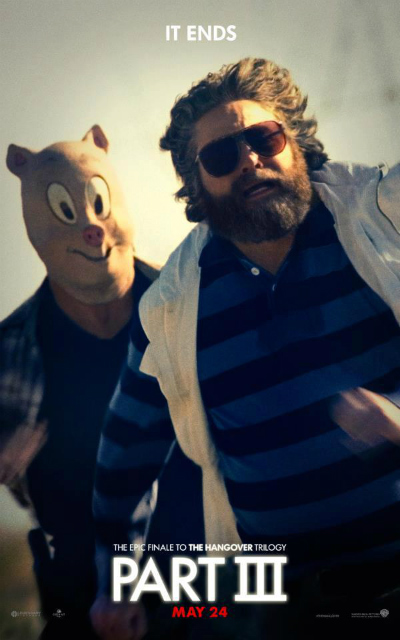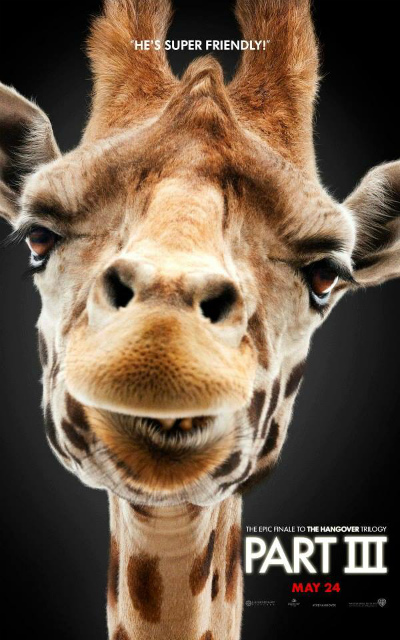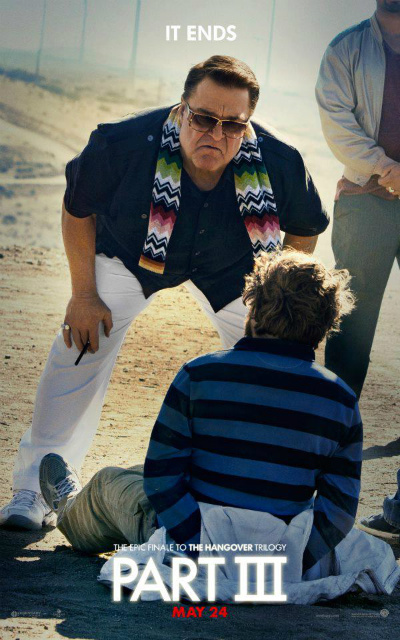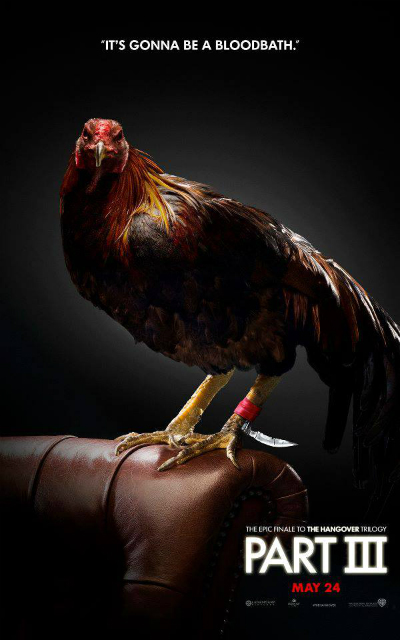Fanboy Flick Pick: The Hangover Part III Is Weirdly Unfunny Yet Bizarrely Brilliant…Maybe
 |
There are many things you’re probably expecting from The Hangover Part III – a retread of the first two, perhaps, or a series of good, hearty laughs. You aren’t getting them.
What you are getting is more challenging, and possibly less entertaining: a threequel that is in itself a critique of its own existence. Not only is it about intervention and rehab – it is its own intervention and at least attempted rehab. Where the other two movies played danger for laughs, this one plays laughs for danger (perhaps they should have set it in Soviet Russia, heeeeeeeh heeeeeeeh heeeeeh). Some will argue that this is an undercurrent which is accidental, but I believe otherwise. Director Todd Phillips got his start doing documentaries on things like fraternity house hazing rituals and self-destructive punk performance artist G.G. Allin, so I think he understands full well what hangover-inducing behavior can really do, and it ain’t all laughs.
Breaking from tradition by not beginning with a Danzig song (fear not, Glenn is represented later in the movie), Phillips instantly inverts the expectations of those who’ve been paying attention by substituting Hanson’s “Mmmbop,” as enjoyed by Alan (Zach Galafianakis), who’s drunk-driving with a giraffe in the back seat. Speeding under a low bridge, he decapitates the animal and causes a massive pile-up; the resulting stress of which causes his father (Jeffrey Tambor) to drop dead. I love dark humor, but this isn’t quite that; in opposition to, for example, Anthony Jeselnik daring you to laugh at his molestation jokes, this feels like Phillips deliberately disturbing you by appearing to play these things off as casual jokes in a big-budget blockbuster (while acknowledging that they should not be so played). I may be reaching, but bear with me.
 |
With Alan’s behavior having finally caused absolute, irreversible disaster, the family decides he has to go to a mental health facility in Arizona, but they know he’ll only go along with it if his Wolfpack buddies are part of the intervention. So Phil (Bradley Cooper), Stu (Ed Helms) and Doug (Justin Bartha) set off on a road trip with Alan in tow, only to be intercepted by some bad guys led by John Goodman, who have convoluted ties to the series’ favorite recurring insane criminal, Leslie Chow (Ken Jeong). Bottom line – they take Doug hostage and charge the rest of the gang with finding Chow, knowing that he’s maintained a pen-pal correspondence with Alan, and broken out of the Thai prison he was last left in. They have three days, and it’s a task that will send them first to Tijuana and then back to Las Vegas.
 |
Alan is the primary protagonist this time around, and it’s all about his journey to figure out that toying around with danger ultimately starts getting unhealthy, especially when people can’t protect you any more – he’s addicted to trouble and is now hitting rock-bottom, having partially set in motion the kidnapping by some of his actions in the previous films. And what’s slightly brilliant is the way the movie mirrors this, taking situations that ought to be hilarious by the standards of mainstream comedy and just showing how sad they actually are. I’m no vegan, but when the gang ends up fighting some homicidal roosters to the death because the roosters were force-fed a diet of cocaine and other roosters, it’s more depressing and desperate than laugh-inducing.
 |
Later, the gang tries to drug some dangerous dogs with just the right amount of Demerol to keep them alive…and Chow breaks their necks anyway. It’s the kind of extreme action that a childlike headcase like Alan needs to see in order to realize Chow’s not a positive friend to have in his life, but it also feels like Phillips may be rubbing our faces in the dirt, telling us that if this is what we find funny onscreen, and more is what we want in our sequels, he’s gonna deliver, but maybe we should consider what it says about us. These characters who have amused us for three movies do so by suffering, but at least in the prior two, the end-effects turned out to be more-or-less reversible, and the outcome ultimately positive. The difference between II and III is like the difference between a raging kegger with drunken hook-ups when you’re in college, and one when you’re middle-aged and by yourself. The former can change and improve your life, while the latter says you’re a sad case and should reevaluate your choices.
And that’s probably not what you’re looking for in your comedy. The movie does send the audience home happy with a mid-credits bit that’s truer to comedic form, but at the same time even that too is weirdly pessimistic. It suggests that complete rehab will never be permanent for our heroes, because we – the viewers – are that crazy friend who keeps dragging them back into relapses by voting with our dollars. Meanwhile we are ourselves hooked…on unending franchises.
Phillips seems to be trying to break that cycle in a very weird way. I don’t know that I like The Hangover Part III, exactly, and I’m not even sure I’m supposed to…but I have a lot of respect for how it goes about its business.
“Laughter is symptomatic of comedy, but not endemic to it” – one of my Film School professors, probably quoting somebody else.
